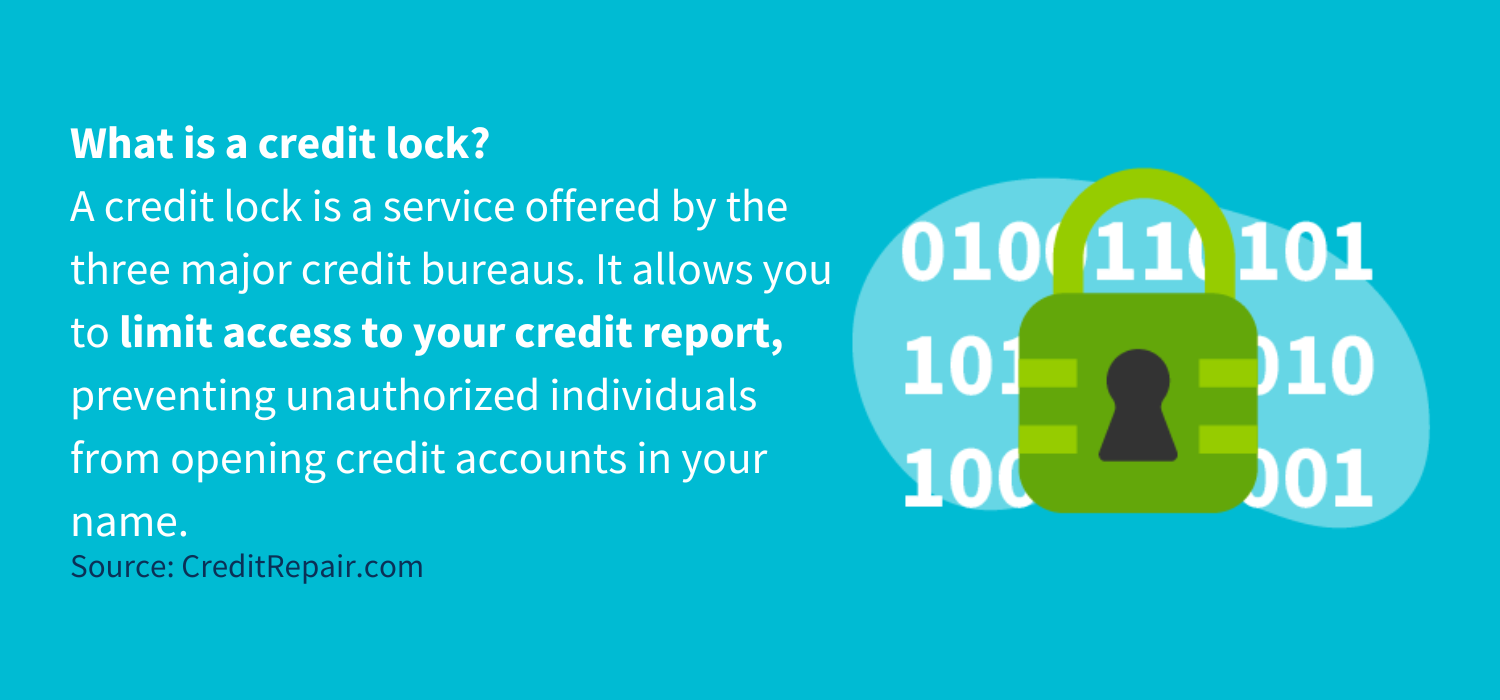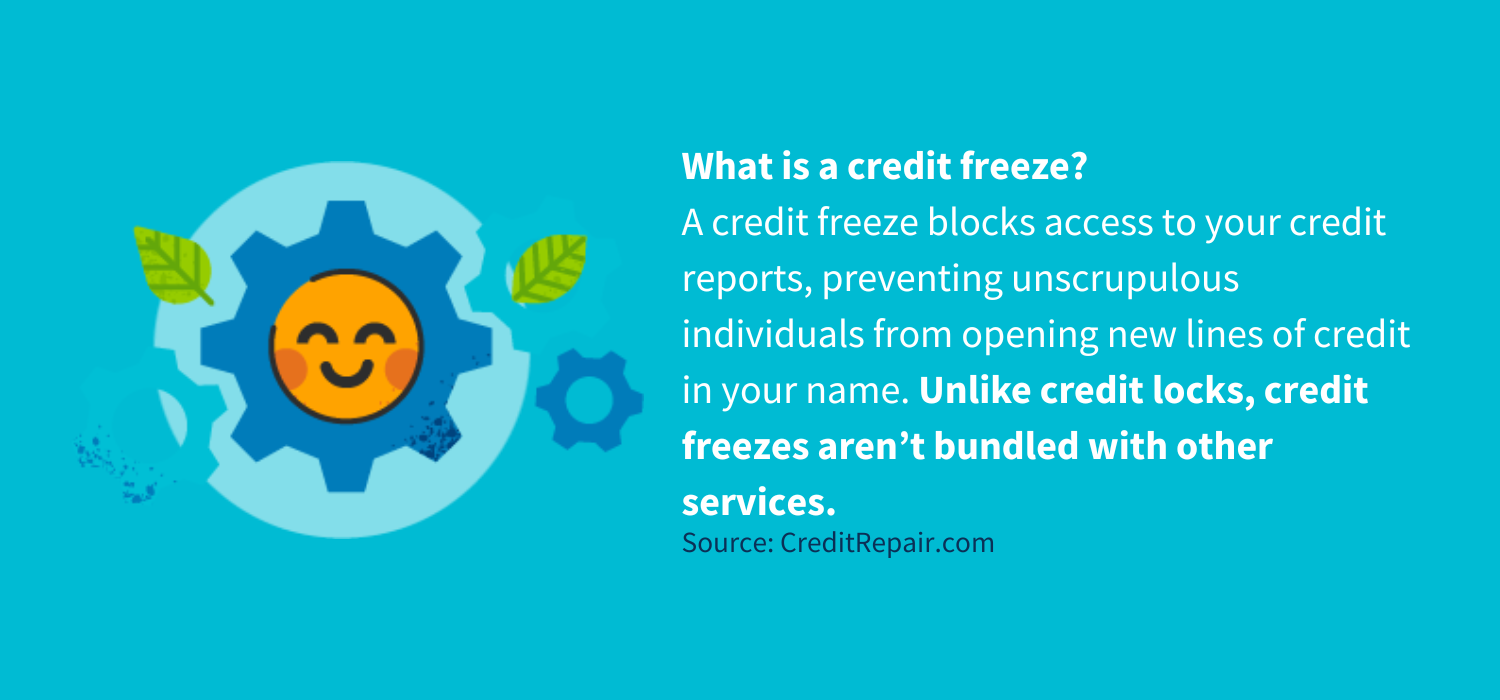
Disclosure regarding our editorial content standards.
With more than 1,800 data breaches in 2021, many people are wondering the differences between credit freezes and credit locks. Both tools protect you by preventing unauthorized access to your credit reports.
The main difference is that a credit lock is a service offered by the three major credit bureaus, while a credit freeze is something you must request on your own. Keep reading to learn more about these important tools for credit management.
What is a credit lock?

A credit lock is a service offered by the three major credit bureaus. It allows you to limit access to your credit report, preventing unauthorized individuals from opening credit accounts in your name. Credit locks are typically bundled with other products, such as monthly credit monitoring or identity theft protection.
How do credit locks work?
A credit lock can stop scammers from stealing your identity and ruining your credit. Once the lock is in place, no one can access your credit reports without permission. Even if an identity thief manages to get your Social Security number and other personal information, they won’t be able to complete any credit applications because lenders won’t be able to access your reports.
What do they cost?
The cost of a credit lock varies by bureau. At Experian®, a credit lock is included with Experian CreditWorks Premium℠, which costs $24.99 per month after a free seven-day trial. In addition to Experian CreditLock, a CreditWorks Premium membership comes with identity theft insurance, three-bureau credit monitoring and access to dedicated fraud resolution agents.
Equifax® offers free credit locks with its Lock & Alert program. TransUnion® charges $29.95 per month for its TrueIdentity program, which includes Credit Lock Plus, a service that allows you to lock and unlock your TransUnion and Equifax credit reports.
How to initiate a credit lock
Follow these instructions to initiate a credit lock at the three major credit bureaus:
- Equifax: Sign up at the Equifax website. You’ll need to provide your personal information and create an Equifax account if you don’t already have one.
- Experian: Visit the credit lock page on Experian’s website. Click the “Lock Your Experian Credit File” button to register for a CreditWorks Premium account.
- TransUnion: Open the Credit Lock Plus page on the TransUnion website. Click the “Protect Your Reports Now” button to register for an account.
How to remove a credit lock
To remove a credit lock, you need to visit the bureau’s website or download its mobile application. Equifax uses the Lock & Alert app, which is available in the App Store or on Google Play. The Experian app is also available for iPhone and Android devices. For TransUnion, navigate to the member login page and click the “Login” button under the TrueIdentity heading.
Pros and cons of credit locks
The reason credit locks aren’t as secure as credit freezes are because you can unlock your reports at any time using a website or mobile application. This does have its benefits, such as when you want to apply for a home loan or finance a new vehicle. The downside is that if an identity thief can gain access to the website or app, it can allow them to unlock your account and access your credit reports.
What is a credit freeze?

A credit freeze blocks access to your credit reports, preventing unscrupulous individuals from opening new lines of credit in your name. Unlike credit locks, credit freezes aren’t bundled with other services. You can freeze your credit without paying for a monthly membership or signing up for identity theft insurance, credit report monitoring or other products.
How do credit freezes work?
Once you freeze your credit, only a limited number of organizations will be able to access your reports. This includes creditors on accounts you’ve already opened, companies you authorized to monitor your credit and government agencies involved in collecting child support or enforcing other types of court orders. If you need to open a new credit account, you can unfreeze your reports as needed.
What do they cost?
In 2018, a new law went into effect requiring Equifax, Experian and TransUnion to offer no-cost credit freezes to consumers. You can get a free credit freeze even if your identity hasn’t been stolen, making it easier to protect your credit.
How to initiate a credit freeze
When you contact one of the three bureaus to request a credit freeze, you’ll need to provide your name, date of birth and Social Security number. Here’s how to freeze your credit with each of the three big bureaus:
- Equifax: Request a security freeze on the Equifax website or call (800) 349-9960.
- Experian: Request a credit freeze on the Experian website or call (888) 397-3742.
- TransUnion: Request a credit freeze on the TransUnion website or call (888) 909-8872.
How to remove a credit freeze
To remove a credit freeze, contact each bureau individually:
- Equifax: Call Equifax Customer Care at (888) 298-0045 or visit the Security Freeze section on their website.
- Experian: Call (888) 397-3742 or visit the Experian Security Freeze Center.
- TransUnion: Visit the Credit Freeze page on the TransUnion website or call (888) 909-8872.
Pros and cons of credit freezes
The biggest advantage of a credit freeze is that it can protect your credit reports against unauthorized access. As a result, you’re less likely to become a victim of identity theft. Another advantage is that you can unfreeze your credit when you need to apply for new accounts.
The main drawback of a credit freeze is that some lenders can still access your credit reports. That means smart identity thieves may be able to open new accounts in your name even if you have a credit freeze in place.
What is a fraud alert?
If you suspect fraud, you can place a fraud alert on your accounts with the three major credit bureaus. When a fraud alert is in place, every business must verify your identity before opening a new account in your name.
If someone attempts to open a store credit card or buy a vehicle with your personal information, they won’t be able to complete the transaction. A typical fraud alert lasts for one year. If you’re a victim of identity theft, you can get an extended fraud alert, which lasts for seven years.
If you contact any one of the three major credit bureaus to place a fraud alert on your account, they’re required by law to share this information with the other two agencies so the alert is placed on all of them.
Why would you want to use a fraud alert instead?
A fraud alert is appropriate if you suspect fraud or know someone has stolen your identity. It requires businesses to take the extra step of verifying your identity any time someone applies for credit in your name, which may prevent unscrupulous individuals from racking up debt under your credit file.
How to decide if you need to freeze or lock your credit
When deciding whether to freeze or lock your credit, think about your current financial situation. If you’re just starting and may need to apply for several types of credit in a short period, a lock may be better because you can unlock your credit online or via a bureau’s mobile application when needed. Freezing may be better if you’re already established in your home and career and don’t anticipate needing to open new credit accounts very often.
Cost also plays a role in deciding whether to freeze or lock your credit reports. Although Equifax doesn’t charge for its Lock & Alert service, Experian and TransUnion charge between $24.99 and $29.99 per month for their memberships. If you don’t want to pay a monthly fee, you may want to do a freeze instead.
Protect your credit
It’s important to check your credit reports regularly and make note of any unusual entries. If someone has stolen your identity or you notice any inaccuracies, CreditRepair.com can help you file disputes with each of the three bureaus. You should also consider freezing or locking your credit to prevent unauthorized access to your credit reports.
Note: The information provided on CreditRepair.com does not, and is not intended to, act as legal, financial or credit advice; instead, it is for general informational purposes only.
Questions about credit repair?
Chat with an expert: 1-800-255-0263






